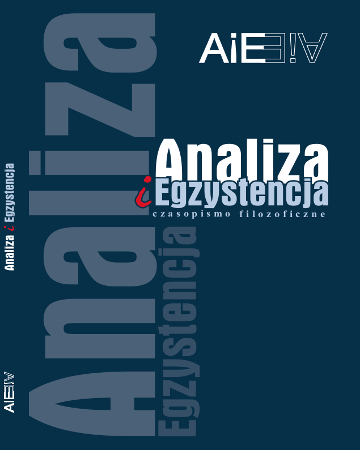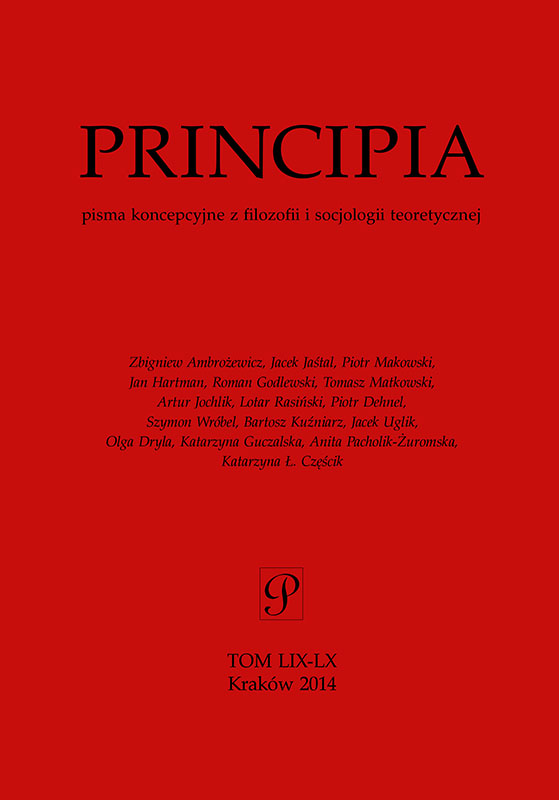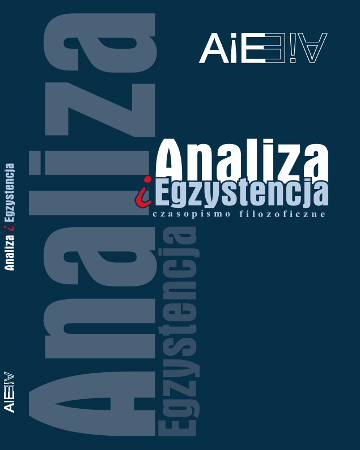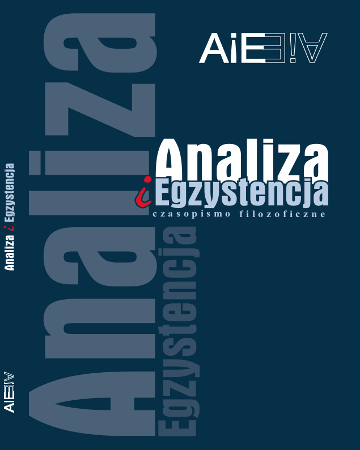
We kindly inform you that, as long as the subject affiliation of our 300.000+ articles is in progress, you might get unsufficient or no results on your third level or second level search. In this case, please broaden your search criteria.


The article propounds an interpretation of Nietzsche’s philosophy, in which the issue of illness would be instrumental. However, in contrast to any kind of reductionary biographism, the illness should be conceived as inextricably intertwined with the thinking itself. Nietzsche’s own illness was initially nothing more than a personal problem, yet it soon influenced his whole life, forcing to forgo the academic career. Thus afflicted, the philosopher used his experience to develop a new view on corporeality, diametrically opposed to Cartesianism. In the post-Cartesian model, objective thinking and illness have nothing in common; either corporal suffering exerts no influence upon thoughts, or the mind sinks into pure insanity. Whoever lost their faculties is still capable to stick to rationality, if only they accept the diagnosis, however subjectively unconvincing it would seem. Suspicious of the notion of truth, Nietzsche reverses the post-Cartesian model. Objective thinking, neatly separated from illness, as well as rational diagnoses appear to him as a fetish supporting those who cannot deal with their own corporeality. They repress their weaknesses, assuming the unfounded belief in objective thinking, which can be practised irrespective of personal malaise. However, Nietzsche’s suffering, which recurred irregularly and had no detectable grounds, couldn’t be separated not only from thinking, but from life as such. The philosopher was thus lead to advance a concept of “diet”, construed as broadly as possible, including the selection of food, lectures and embraced thoughts. The diet is the uttermost refutation of diagnosis, as it treats the mind and the body as a unity changing in time. The illness, which accompanies life inevitably, serves as a permanent yardstick of quality of our thoughts. Moreover, it gives us the opportunity to experience pure becoming.
More...
The aim of the present article is to reveal the essential connection of MichelFoucault’s critical attitude regarding social relationships with the formation of thepostmodern ethos of making out of the human life an artwork. It will be shown thatthe main object of Foucault’s critique are the relations of power and knowledge inthe Christian priesthood and their modern transformation in nonreligious institutions.From this point of view, mainly based on the philosophy of Friedrich Nietzsche,the Christian ethics occur to be an accumulation of techniques of disciplinizationand normalization. This attitude towards Christianity and modernity leads to thepostmodern ethos of making out of life an artwork. This notion is mainly based onthe antique Greek and Roman philosophy, where instead of obeying to universalethical principles the human being struggled to be his own master. Therefore thepostmodern existence tries to be beyond all traditional boundaries, which resultsin the danger of neglecting the historical fact, that Christianity was and still is animportant institution of the Western Civilization
More...
As a literary work, Jean Paul Sartre’s theatrical arts gathered together in a Polishpublication named Dramas propagates and illustrates in detail the real philosophicalmasterpiece which is Being and Nothingness. Inspired by the author’s philosophicaldoctrine, dramas were made to show the existential thought. In that way Sartre-philosopher in Being and Nothingness reveals his thought in a explicative way. On theother hand, Sartre-playwright by writing dramas creates unrestricted realities whichcan be in various ways projected into the readers’ imagination, and there his generaltheses find detailed application. Philosopher wanted to show the philosophical truththrough literature, and he was very consistent about it. Being and Nothingness andDramas could be treated as sources of knowledge about his philosophy, just like hisnovels or works about his literature. Sartre uses his philosophical program to realizehis ideas for prose. It appears that philosopher did not divide the notion between“philosophical literature” and “literary philosophy”.Sartre is the creator of the theater of situations because characters from hisdramas find themselves in concrete situations and they have to make specific decisions.The dramas of the philosopher have a moralistic tone because we see inthem Sartre’s concept which says that humans may reject the role which societygave him. Man can choose the authentic existence. Philosopher’s mission was toinfluence the readers of his works. He desired to convey to people the truth abouthuman freedom. In conclusion, Sartre’s dramas are a kind of theatrical phenomenon,because as a philosopher he interested the spectator as much as an playwright.
More...
Theory of art as so called the theory of intuition-expression extremely and clearlydemonstrates the way of a mystic experience as a experience of the Absolute. Croce’sconcept of the Absolute is a sign of being spiritual, no diverse in itself, what is morefully given in an emotional (feeling) artistic expression (artwork). Imagination asan appropriate representational power expressively became, in this context, the sphere of the Absolute (indifferent intuition, totality of Being) in which the Absolute realizes – through creation of art – the material world. An artist, because of his creative imagination, appears for Croce as a complete, perfect man and fulfills a creative and demiurge function for the world. According to Kandinsky, inspired by Steiner’s antroposophy, art doesn’t present concrete things but using a maximum simplistic concrete form, expresses and shows things in itself, as an ideal, spiritual, absolute but compared to the world of concretes, the mentioned things are internal, substantial, essential and “abstractive”. Abstraction as a “true reality” demands of giving up the empirical world and looking continuously at the sphere of absolute “necessity”. Art is a specific, inspired knowledge of the Absolute and an abstractartist inspired by this knowledge and expressing it in his artworks must be understoodin a way characteristic of mysticism (an inspired visionary-prophet, perfect man).In Adorno’s aesthetic theory art actualizes the nature in aspect of beauty and thisactualization consists in changing towards the lack of identity. An individual (eachone ) artwork is the “epiphany” of “spirit” of art, that is an aesthetically Absolute.As a result an artwork presents itself as a kind of “mystic event”, but an artist expressingthe sphere of the Absolute still be an inspired visionary going beyond the natural (empirical) order.All of these theories of art are based on the old neoplato-arabian theory of “creativeimagination” which determinates their quasi- or pseudo-mystic aspiration. They are not go beyond tradition, that is “natural mysticism” (characteristic of pantheism).This kind of mysticism differs from revelation mysticism on the grounds of Transcendence (aspect of a object) and classical moment of contemplatio (aspectof a subject).
More...


In the article I claim that the problem of abortion cannot be solved by referring tosuch biological fact, as having human genetic code by any prenatal being.
More...

The article is a reductio ad absurdum of assumptions which are shared by a largenumber of followers of the animal welfare movement and utilitarianism. I arguethat even if we accept the main ethical arguments for a negative moral assessmentof eating meat we should not promote vegetarianism but rather beefism (eating onlymeat from beef cattle). I also argue that some forms of vegetarianism, i.e. ichtivegetarianism,can be much more morally worse than normal meat diet. In order to justifythese thesis I show that there are significant moral differences in the consumptionof animal products from different species.
More...
The problem of the moral status of animals holds an important place in contemporaryethical debates. Usually the intensity of ongoing discussions focuses on sentience(the ability to sense pain and/or pleasure) as criterion of moral status, which wasfirst introduced by Peter Singer. This article aims to show difficulties in his understandingof moral status like the argument of substitutability. It also supplementsutilitarian arguments on behalf of the animal’s interest with the notion of potentialityand postulate that the moral status should not only be attributed to the beingsthat are currently capable of feeling pain and/or pleasure, but also: 1) to beingswho currently do not have this capacity but are in the process of its development(eg. fetus), 2) beings that temporarily lack this characteristic they once had, but willregain at some point in the future (eg. human/animal in a coma), and 3) consciousbeings that are not capable of feeling pain (eg. patients with congenital analgesia)but that meet other morally relevant criteria (they are self-conscious, they are partof the family). This introduced viewpoint recognizes our obligation to not causeany suffering in animals (unless absolutely necessary) but also that in the majorityof the cases killing them should not take place.
More...
Article is devoted to executioner ethics in the sense capital punishment ethics. At first definitions and concepts are presented. Next: torture ethics, execution ethics, executioner ethics principles, evaluations of executioner and executioner place in culture. Author contemplates historical and cultural background connected with executioner profession from mainly the three points of view: torture ethics, execution ethics, executioner ethics in the light both deontological as utilitarian currents of ethics.
More...
In this essay I scrutinize importance of Principles of Double Effect and MoralSymmetry in regard to the question of moral acceptance of euthanasia legalization.My conclusion is that although there is no substantially moral difference betweenpassive and active euthanasia, the problem of morally justifiable legalization ofeuthanasia is still not resolved. That is because some reasons suggest the possibilityof special discrepancy between moral acceptability of euthanasia in certain cases andmoral demand to preserve legal prohibition of euthanasia in general. In the paperI criticize the popular opinion that utilitarianism cannot account of why we giveweight to the question of moral permissibility of intentions. I claim that contraryto this false platitude utilitarianism can even accommodate practical relevance ofPrinciple of Double Effect, but not as a valid per se principle.
More...
The aim of this article is an attempt to evaluate the following issues related to the last stage of illness and death: discontinue of artificial nutrition and hydration, discontinue or refrain from life-saving therapy or palliative sedation. Mentioned cases are borderline situations. Medical consultants, taking the decisions of removing the tube feeding, discontinuing or not taking up the procedure which causes maintain the patient’s life or applying terminal sedation, are aware, that above will lead to patient’s death. This is the reason why above situations cause lots of doubts, the most important of which is a question, whether we are dealing with passive euthanasia. Is it possible to carry out the border between forbidden “kill” and permitted “let die”. Any attempt to answer this question is a kind of consensus.
More...
This article is an outline of David Hume’s philosophy of religion. His critical stanceon the rationality of the religious beliefs consists of two issues. First, a problem ofthe arguments for the existence of God (the cosmological argument and the argumentfrom the design) will be discussed e.i. can we infer a cause from an effect?Second, I will try to answer the question whether the religion is natural (universal andoriginal): there will be discussed the origins of religion and the issue of religion asan artificial morality. Last there will be presented some argument for the rationalityof religion on the basis of David Hume’s philosophy of religion.
More...
The main goal of this article is to outline Barry Stroud’s conception of philosophy.Philosophy, in his opinion, aims at understanding of various kinds of phenomenaand our attitude towards them, but this understanding doesn’t manifest in a set ofphilosophical theses. A philosopher should become aware of a peculiar character ofunderstanding which he wants to reach, and in consequence, admit that a metaphilosophicalreflection is integral part of philosophical investigations. An understandingof the nature of philosophical investigations is not possible without pointing to theirsources. Thus the task of a philosopher is to diagnose philosophical problems byshowing from which earlier questions and theories they have arisen. On the otherhand, philosophical reflection must be always confronted with the things which areaccepted by all of us, otherwise understanding caused by that reflection wouldn’trefer to phenomena belonging to our world. Stroud thinks that a description of one’sconception of philosophy requires looking at the manner in which that philosopherapproaches to a given problem. Acknowledging the rightness of his remark I considerhis approach to philosophy using as an example his treatment of the question “whatis meaning?”. I point out that Stroud looks into the source of the Wittgensteinian slogan “meaning of the expression is its use”. The main Stroud’s conclusion is thatif a description of a use of a certain expression is to explain the meaning of thatexpression, semantical terms have to appear in that description. This statementcould be abandoned, Stroud claims, only if we rejected the things which all of usacknowledge as obvious.
More...
In the article I am describing epistemology R.H. Lotze’s, which as first enteredcomprehending the value into language of philosophy. He emphasized the limitationof the human mind in his project. He thought that metaphysics was insufficient asa base for science to arise. Therefore the sphere of the human cognition is supposedto be limited to a system of the importance and its confirmation in experience.As a result of such a thinking, it is necessary to express the cognition through thevalidity. Namely through the awareness of stretching it what detailed and general.
More...
In the paper Charles Taylor’s notion of strong evaluation and its crucial role inrelation to human agency has been presented. The departure point of our analysisis Harry Frankurt’s famous distinction between first- and second-order desires.Then, following Taylor, we describe two separate ways of evaluation of our desires– weak and strong evaluation. In further discussion the reconstruction of Taylor’stranscendental claim concerning the inescapability of strong evaluation in relationto selfhood is given. Finally we consider criticism that Owen Flanagan poses aboutTaylor’s account.
More...
The aim of the article is to describe the theoretical basis of the liberal democracyaccording to Ernest Laclau. His conception is a useful device for the analysis ofa socio-political situation of Others (the Excluded). By exposing Laclau theoreticalperspective (discourse, empty signifier, hegemony, emancipation) I attempted todisplay that this perspective does not only define the significant frames, thanks towhich the social life may go further, but it also reveals the multiplicity of contexts,diversity of social issues and various possibilities of their interpretation. Importantfactor of this perspective is that it points out the need for taking the action, which isaimed to improve democracy. According to Laclau the moment of visualization ofour desires is much more important than its realization, because it drives us towardaction and creative thinking.
More...